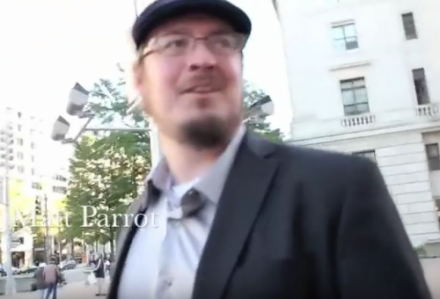|
Majorityrights Radio > Category: U.S. Politics
Part two of Kumiko Oumae’s critical examination of Matt Parrott’s Christian traditionalism.
Subjects covered included: Global baptism, Christian universalism, homosexuality, Africa and the population question, Syria.
58 mins, 52.6 MB
 Matt Parrott at NPI. Summary: A two-part critical examination, conducted by Kumiko Oumae, of many areas of Matt Parrott’s Christian traditionalism, from Matt’s faith fundamentals as an Orthodox Christian traditionalist and nationalist - in that order - to Matt’s views on freemasonry, the relationship of Judaism to Christianity, the pagan past, how religion renews, global baptism, Christian universalism, homosexuality, Africa and the population question, and Syria.
Can I just say, from a personal perspective, that I thought the interview was a success, notwithstanding any hostilities which may have existed prior to it (and since). Kumiko was very well prepped and she did a great job of maintaining a high tempo of relevant and close questioning, to which Matt responded generously.
My thanks to you both.
This is part one: The fundamentals of Matt’s Orthodox Christian traditionalism examined, Freemasonry, Judaism and Christianity, the making of religions.
1 hr 22 mins, 75 MB.
 Vote Leave on 23 June. Summary: This interview was hosted by Henrik Palmgren at Red Ice Radio, and the roundtable discussion was about Brexit and its significance for Europe and the world.
The first hour is freely available for all to download, the second hour is available with a subscription to Red Ice Radio.
The participants on the roundtable were:
- Henrik Palmgren: Henrik Palmgren was born in Götaland, Sweden, the land of the Goths. He is the founder and Editor-and-Chief of Red Ice. Henrik is best known as the host of Red Ice Radio and TV, producing most of its content. He is primarily concerned with European heritage, culture and counteracting global internationalists.
- Guessedworker (GW): An English nationalist in favour of international nationalism. Having lived in 1950s era Britain, he has since seen his nation undermined by neo-liberalism and Jewish-inspired leftism. He created Majorityrights.com in 2004 as a forum to find solutions for the myriad of problems facing not only the British people, but all European peoples as well.
- Kumiko Oumae: The Eurasian affairs contributor for Majorityrights.com. She believes that in order for Europe to control its own destiny – and for it to be a good trade and global development partner for Asian countries – there must be a serious dialogue on Europe’s historical role in the world and the justification of that role, as well as how the European states can resolve the crisis of legitimacy that their governments are presently facing. Kumiko also works in the security and defence sector in the United Kingdom.
- Daniel Sienkiewicz: An ex-pat American of European descent, living in Europe. He has been troubled by the implications of “anti-racism” and has been testing various means to advocate for European peoples for as long as he can remember. Daniel rejects many common approaches, including all characteristically Cartesian attempts, such as scientism, as ineffective means to solve the problems that currently threaten ethnic Europeans.
We were honoured to have the opportunity to link up with Red Ice Radio in this way, they have our thanks.
Red Ice Radio, ‘Brexit: Time for the UK to Leave the EU’, 17 Jun 2016:
We begin by discussing Brexit and its significance in the ongoing struggle between nationalism and internationalism. Kumiko argues that, in many ways, the current economic paradigm in the West isn’t quite internationalism proper, but rather the United States being allowed to dominate due to passivity on behalf of the European Union. Despite a few minor disagreements, all three guests adamantly support withdrawal from the European Union. We then discuss the original vision of the European Union – that of a unified, more prosperous Europe – and how the elites therein have sabotaged that vision by allowing in millions of non-European immigrants. Later, we talk about the unfortunate lack of patriotism within certain European countries. We conclude this episode with a discussion on the manner in which the mainstream media has used the murder of Jo Cox as an excuse to those in favor of Brexit.
Links:
Whereas he used to have a completely botched notion of post modernity - mixing-up what should be the antidote to modernity and liberalism with liberalism itself - it now appears that we are improving Dugin’s understanding - viz., that modernity is the problem and the essence of liberalism.
His ideas in this talk are largely amenable and well considered.
His proposition that the state is a bit too much of an artifice to suffice by itself and that there needs to be a hypothesized realm, as we would say, beyond the physically verified moment, which girds and orients a people, is also well considered.
However, now that we are getting him to a better understanding of “post moderntiy”, viz. White post modernity, we need to get him to a better understanding of biological reality and “racism.”
Anti-racism is the quintessential modernist liberal notion; it is a Cartesian farce: It has been proposed as innocent but it is not -
Anti-racism is prejudiced, it is not innocent, it is hurting and it is killing people.
For “racism” is a necessary concept in a benign form, which is not supremacism nor a singular conclusion to aggrandizement and annihilation of an opposing people (as YKW propose and liberals might accept as a definition). It is in fact, a practical concept that is practiced by ordinary people everyday of necessity, as a non-Cartesian requirement of the human condition, of being in the world - one must discriminate in human-sized categories, including social classification - of one’s own people and of other peoples - to form a coherent basis of ones own and to form a basis of human ecologies for our systemic coherence, social accountability, warrant and agency.
These classifications are “hermeneutic”, that is to say that they are not absolutely empirically based in every moment, as the taken-for-granted and the state of partial knowledge - faith, if you will - must subsist behind the working hypothesis.
Call it a working hypothesis, call it faith, call it rules, call it narrative, call it taken for granted, call it the partly unknown, call it a mystery, a quest, an adventure, some of that as you must, some of it you might, as it has practical function to ensconce the under-determining facts of the empirical; but I have believed and continue to believe that a sacred overlay, in orientation and guidance of a people is a good idea.
I believe that it is a hermeneutic notion nevertheless, which is itself accountable to deal concretely with biology, sex and genetics, mediating toward fairness and justice in regards to this social capital - otherwise, without this empirical accountability, this “spiritual” realm will be the realm of evil charlatans.
Peace activist, 9/11 activist, former CIA asset, and patriot talks to DanielS and GW about power and politics, corruption, immigration, and the future of America and the West
59min 15sec. 54.1MB.
Stan Hess, formerly of Voice of Reason Radio, DanielS and GW discuss the hippies and activism today, with some dropping out (but not that dropping out).
43.6 megabytes, 47 min 45 sec.
This interview was conducted midst an SPLC-triggered media frenzy. Immediately after completing this interview, the New York Times reporters showed up at the Leith, North Dakota residence of Craig Cobb -- declared one of the most dangerous men in the US by the SPLC's "Hate Watch". Listen for the true story behind the frenzied article that will soon appear in the New York Times, and get an idea of Craig Cobb, the man -- not the mythic monster.
Jim Giles interviewed James Bowery a couple of days ago on Radio Free Mississippi. The primary territory is the conflict between Jewish interests and the Enlightenment values of truth and freedom—conflict as exemplified by the hostility of Jews toward the laboratory of the states to found discourse on experimentation rather than argumentation. It is 1 hour 48 minutes.
A long and winding conversation, as much as an interview, with Alex Linder. One hour seventeen minutes long, in fact. File size 35.2MB.
|




